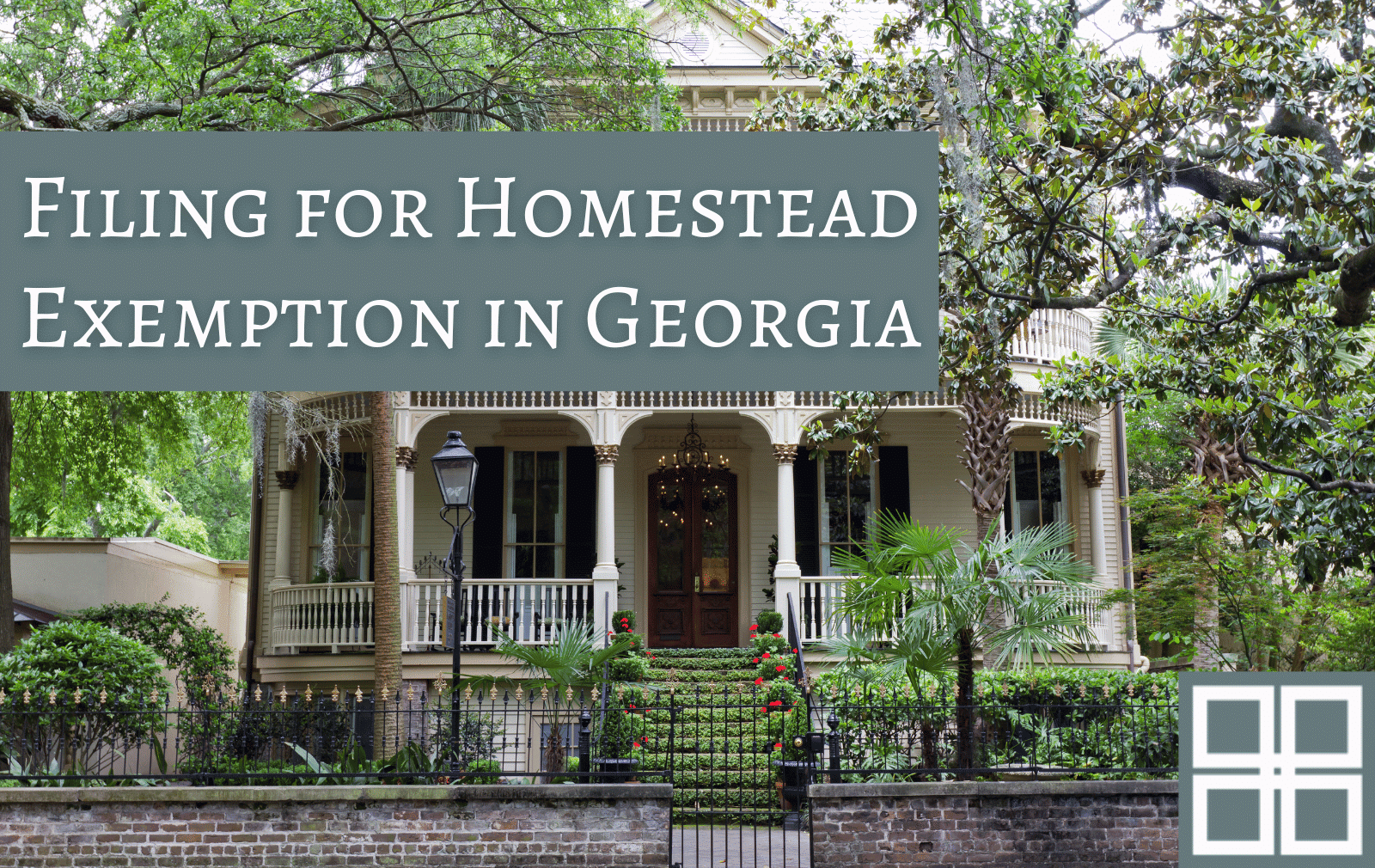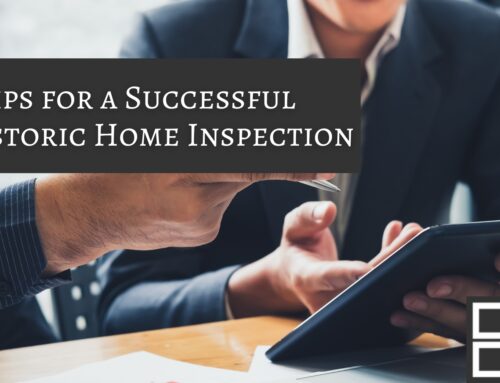Filing for Homestead Exemption in Georgia
If you’re a Georgia homeowner, well great news! You may be eligible for homestead exemption, which could potentially save you thousands of dollars in property taxes.
If you’ve owned your home for a while, then you may be familiar with homestead exemption and the process for applying. However, for new residents of Georgia and first-time homeowners, it’s important to have a clear understanding of the application process.
In this article, I’ll explain homestead exemption, and how it applies to Georgia homeowners. More specifically, I’ll offer a comprehensive guide for applying in Chatham, Effingham, and Bryan counties.
I’ll tell you everything you need to know, including eligibility requirements, application procedures, and important deadlines. Also, I’ll let you know about any special exemptions available in each county.
What is homestead exemption?
Homestead exemption is a tax break that some states offer to homeowners who use their home as their primary residence. It’s designed to lower the amount of property taxes that you have to pay on your home each year. In other words, it’s a way to save some money on your taxes and keep more money in your pocket.
The amount of the homestead exemption varies depending on the state, but in general, it can be a significant amount of money. So, if you qualify for the homestead exemption, it can make a big difference in your finances.
It’s important to note that not everyone is eligible for the homestead exemption. There are certain requirements that you have to meet, such as owning and occupying your home as your primary residence.

Homestead exemption in the State of Georgia
Generally, Georgia will allow homeowners to claim a homestead exemption on their property. This includes both the home itself, and the underlying land. In order to qualify, you must have owned the property on January 1 of the current tax year.
To apply for the homestead exemption, you’ll first need to fill out the Application for Homestead Exemption from. This is the statewide application used across all counties.
Additionally, you must physically reside in the home, and it has to be considered your legal residence. If you happen to be temporarily absent from your home due to illness, don’t worry, you won’t be disqualified. A friend or family member can inform the tax receiver or commissioner and your homestead exemption will still be granted.
Guidelines on when and where to file
It’s important to know when and where to file your application. Here are some important guidelines to consider.
Deadline for filing
Property tax returns must be filed by April 1. If an application is received after that, it won’t be granted until the next year. Unfortunately, missing the deadline means losing the exemption for that year.
An important thing to remember is that you don’t have to wait to file your property taxes to apply for homestead exemption. You can submit your application at any time during the year, up to the deadline.
Where to File
Homestead exemption applications are filed with your county tax officials. In most cases, this means submitting your application to the tax commissioner’s office. However, some counties delegate this responsibility to the tax assessor’s office, so it’s important to find out for your particular county.
State offered exemptions
In Georgia, exemptions are offered to any and all homeowners that qualify. Let’s take a look at the exemptions that are offered by the state.
Standard homestead exemption
The State of Georgia provides a $2,000 exemption for the primary residence of qualifying homeowners. This exemption applies to county and school taxes, except for school taxes levied by municipalities and except to pay interest on and to retire bonded indebtedness.
The $2,000 is deducted from the 40% assessed value of the homestead. If your home is a farm you can also claim a homestead exemption in participation with the program of rural housing under contract with the local housing authority.
Individuals 65 years of age and older may claim a $4,000 exemption
Anyone 65 years of age or older whose income, along with their spouse’s, does not exceed $10,000 in the prior year, can claim a $4,000 exemption from all county assessed value taxes.
Retirement sources, pensions, and disability income are not included in this calculation up to the limit allowed by the federal Social Security Act.
If they no longer meet the requirements for this exemption, it is their responsibility to notify the county tax commissioner.
Individuals 62 years of age and older may claim additional exemption for educational purposes
For those 62 years of age or older who reside in each independent and county school district, an additional exemption from all assessed value taxes for educational purposes and to retire school bond indebtedness can be claimed. This is provided that theirs and their spouse’s income doesn’t exceed $10,000 for the previous year.
Any retirement sources, pensions, and disability income are excluded up to the maximum amount allowed by the federal Social Security Act for you and your spouse.
Again, if they no longer meet the requirements for this exemption, they must notify the county tax commissioner.
Floating inflation-proof exemption
If a homeowner is 62 years of age or older they can qualify for a county homestead exemption that is adjusted for inflation and applies to the natural appreciation in the value of the property. This exemption excludes taxes related to bonded debt or interest payments but may be used if the appraised value of the home has increased by more than $10,000.
To be eligible, the combined income of the owner and any other resident of the property, including their spouse, cannot exceed $30,000. This exemption is only applicable to county taxes and replaces any other county homestead exemption, but it does not impact municipal or educational taxes.
Disabled veteran or surviving spouse
Disabled veterans who meet the eligibility requirements can receive a property tax exemption for county, municipal, and school purposes. The exemption includes a base amount of $60,000 and an additional sum that is determined based on an index rate set by the United States Secretary of Veterans Affairs.
However, any value of the property beyond this exemption remains taxable. The exemption can also be extended to the unremarried surviving spouse or minor children of the disabled veteran as long as they continue to use the property as their primary residence.
Surviving spouse of US service member
The surviving spouse of a U.S. service member who was killed in action or died as a result of any war or armed conflict can qualify for a homestead exemption from all assessed value taxes for county, municipal, and school purposes.
The exemption amount is $60,000 plus an additional sum that is determined based on an index rate set by the United States Secretary of Veterans Affairs. The exemption will remain in effect for the surviving spouse as long as they do not remarry.
Surviving spouse of peace officer or firefighter
The unremarried surviving spouse of a peace officer or firefighter who died while performing their duties will receive a homestead exemption for the full value of the homestead.
This exemption will remain in effect for as long as the surviving spouse continues to occupy the property as their primary residence.
Filing in your county
Now that I’ve told you about the state exemptions and requirements, let’s discuss a few individual counties. Specifically, Bryan, Chatham and Effingham counties.
I’ll tell you how and where to file, explain any additional requirements, and special exemptions unique to those counties.
Bryan County

To be eligible for a homestead exemption in Bryan County, you must both own and occupy your home as your primary residence for at least 181 days of the tax year, beginning on January 1st.
Additionally, you cannot claim a homestead exemption anywhere else. If you do not change your name on the property or move to a different address, you do not need to re-apply for the exemption each year.
However, if you switch from one homestead exemption classification to another, such as reaching the age of 65, you will need to re-apply.
Special exemptions
- Bryan County provides individuals aged 65 and older with a local exemption of $50,000 for county, city, and school board-assessed taxes. This exemption is deducted from the assessed amount of the property, which is typically 40% of the appraised value. Essentially, the first $125,000 of the property’s appraised value is not taxable. However, applicants must still meet all qualification requirements.
- Individuals who are under the age of 65 can receive a local exemption of $30,000 for the County and City portion of assessed value taxes in Bryan County. However, this exemption does not apply to the school board portion of assessed value taxation. All applicants must still meet the qualification requirements.
While the rest of the special exemptions from the state are available, the exemptions may be more beneficial from Bryan County.
In addition to the statewide exemption form, Bryan County requires their Military Homestead Exemption Questionnaire for any military-related exemptions.
Where to file
In order to file your application for exemption, you’ll need to visit one of the two Bryan County Tax Commissioner’s offices.
11 North Courthouse Street
Pembroke, Georgia 31321
Phone: 912-653-3880
or
66 Captain Matthew Freeman Drive
Suite 102
Richmond Hill, Georgia 31324
Ph: 912-756-2434
For more information, and for a list of documents to bring when you file, contact the Bryan County Tax Commissioner or visit the county’s homestead exemption page.
Chatham County

Individuals who own and occupy a home along with the land it rests on in Chatham County as their primary place of residence as of January 1 of the taxable year are eligible for a homestead exemption.
If an applicant for homestead exemption owns multiple dwelling houses, they will only be allowed to receive the exemption on one of the houses as only one homestead exemption is granted to one immediate family group.
Rental properties are not eligible for this exemption. Moreover, only those individuals whose names appear on the property’s title and who reside on the property can file for exemptions.
Applicants must appear in person to complete the application, unless they have granted another party power of attorney.
Stephens-Day Exemption
The Stephens-Day exemption is a property tax discount that applies only to Chatham County residents. It is calculated by subtracting the property’s previous year’s value, including any improvements made since then, from its current fair market value.
The Stephens-Day legislation underwent an amendment that permits an unremarried surviving spouse to obtain the original Stephens-Day benefits awarded in the name of their deceased spouse.
To qualify, the property must be registered in the name of the surviving spouse and an application must be submitted following the same procedures as for the homestead exemption.
Additional special exemptions
Apart from the homestead and Stephen’s Day exemptions, several other exemptions exist.
However, to be eligible for any of these exemptions, you must furnish your federal and state income tax returns, Form DD214, VA letter demonstrating disability, or a letter from a licensed medical physician in Georgia as proof.
- Senior School Tax Exemption
- School Tax Disability
- Special Chatham County
- Disabled veterans
- Surviving spouses (cannot be remarried) of 100% disabled veterans, a U.S. Service Member KIA or a firefighter/peace officer
- City of Savannah
- Floating Homestead
- Tax Deferral for the Elderly
Several of the exemptions listed are among the statewide special exemptions. However, they may offer more benefits at the Chatham County level.
Where to file
In Chatham County, exemptions are filed at the Board of Assessors office.
Chatham County Board of Assessors
222 West Oglethorpe Ave.
Suite 113
Savannah Georgia 31401
Ph: 912-652-7271
When filing, Chatham County requires the following:
- A valid Georgia Driver’s License or Georgia Identification Card
- Registration for vehicles owned by and registered in the name of the applicant
- Staff may ask for supplemental identification in the form of a utility bill or Chatham County Voter’s Registration Card
For any additional information, reach out to the Chatham County Assessor’s Office, or visit the county’s homestead exemptions page.
Effingham County

All homestead exemption requirements in Effingham County are the same as state level. However, there are some important things to keep in mind.
Homestead exemption may be revoked or lost due to various reasons. These include, but aren’t limited to:
- No longer being a permanent resident of the property
- Selling the property
- Renting any portion of the property
- Changing the property’s ownership name (e.g., from self to an LLC)
- Receiving a double exemption elsewhere
Please note that receiving an exemption for another property, whether in the same county, different county, or different state, may result in the Tax Assessor’s office fining the taxpayer twice the annual savings for up to three years that the double exemption was claimed.
Special exemptions
Currently, Effingham County offers the same exemptions offered by the state. However, as with the other counties, larger benefits may be available at the county level.
Where to file
Effingham County allows their residents to file for homestead exemption online. However, you can also file in person at the Effingham County Tax Commissioner’s office.
Effingham County Tax Commissioner
901 North Pine Street
Springfield, GA 31329
Ph: 912-754-2121
Effingham County requires the following documentation when filing:
- A valid driver’s license or state issued ID matching the address of property being applied for
- A copy of driver’s license or ID for all family units whether on the deed or not, as well as a copy for all persons on the deed for the purpose of verifying that homestead exemption is not obtained elsewhere
- A utility bill if the driver’s licenses were issued after January 1 of the year homestead is being applied for
- The 1040 federal income tax return for all persons living in the household when applying for the ages 62-64 (S3) exemption and the ages 65 and older (S4) Homestead exemption
- The official Department of Veterans Affair letter stating that you are 100% disabled
- Military Veteran or paid at the 100% rate through the Department of Veterans Affairs, with the date it went into effect for the (S5) Veteran Exemption
- The death certificate for active military K.I.A, death certificate for firefighter, police officer or peace officer killed in the line of duty for the (SD) or (SS) homestead exemption
- If you have a mobile home, proof of ownership for the mobile must be provided via the mobile home title and the land deed
Homestead Valuation Freeze Exemption
Several counties have introduced an exemption that will maintain the property’s value at the base year valuation for as long as the homeowner lives on the property. This means that regardless of the property’s current market value, the homeowner’s taxes will be determined based on the original valuation.
The exemption may apply to county taxes, school taxes, and/or municipal taxes, and in some counties, specific criteria such as age and income may be required. Additionally, in some counties, the law permits the base year valuation to increase by a set percentage each year.
Currently, the homestead valuation freeze exemption is available in both Chatham and Effingham counties. For further information, contact the tax commissioner’s or tax assessor’s office.
Conclusion
Filing for homestead exemption in Georgia can be a valuable financial tool for homeowners to reduce their property tax burden. At the Heather Murphy Group, we encourage all eligible homeowners to take advantage of this exemption to help lower their expenses and potentially increase their home equity.
By understanding the requirements and deadlines for filing, homeowners can ensure they receive the maximum benefits available to them. We certainly hope you’ve found this article beneficial, and if you’re looking to buy or sell your home in Bryan, Chatham, or Effingham counties, our experienced team is here to help! Contact us today to learn more!









